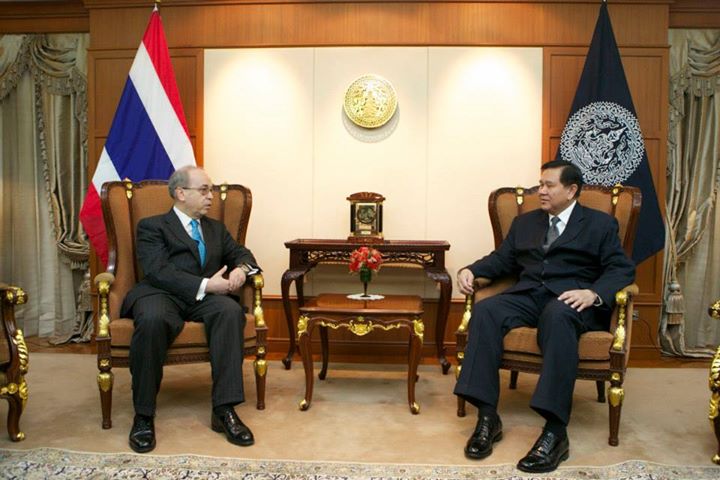ABOVE: Assistant Secretary of State for East Asian and Pacific Affairs Daniel Russel met with Foreign Minister Gen. Tanasak Patimapragorn, former Prime Minister Yingluck Shinawatra and Democrat Party chief Abhisit Vejjajiva. Photo: US State Department.
A top US diplomat Monday said Yingluck Shinawatra’s impeachment could be perceived as “politically driven” after meeting the former premier in Bangkok as the most senior Washington official to visit Thailand since the coup.
The United States has strongly condemned the May military takeover and repeatedly called for a swift return to democracy after the army seized power following months of protests against Yingluck’s elected government.
On Monday US Assistant Secretary of State for East Asian and Pacific Affairs Daniel Russel met Yingluck as part of the Thai leg of a Southeast Asia trip in which he also held talks with government officials and civil society representatives in the capital.
In the New York Times, Russel said he was dispatched to Thailand to tell the junta it was “losing credibility” and that the United States administration would not “paper over problems.”
“Thailand is losing credibility in the eyes of its international friends and partners by not moving more quickly to end martial law, to restore civil rights and to ensure that this effort to engineer a new constitution and hold elections is not purely a top-down affair,” Russel told the Times.
In a speech delivered at Chulalongkorn University in Bangkok he said “the perception of fairness is important,” three days after Yingluck was impeached by a junta-stacked parliament and prosecutors announced corruption charges that could see her jailed for 10 years.
“When an elected leader is deposed, impeached by the authorities that implemented the coup, and then targeted with criminal charges while basic democratic processes and institutions are interrupted, the international community is left with the impression that these steps could be politically driven,” he said.
Russel stressed that the US was not picking sides in Thai politics but advocating a “more inclusive political process.”
He also repeated the US call for an end to martial law and restrictions on free speech and assembly.
US State Department spokeswoman Jen Psaki said that in talks with Foreign Minister Tanasak Patimapragorn, Russel had “underlined that our relationship with Thailand cannot return to normal until democracy is re-established.”
Since seizing power the military has suspended democracy and curtailed freedom of expression in the kingdom, responding aggressively to any form of protest. Under martial law, political gatherings are banned.
Washington suspended $4.7 million in security-related aid to Thailand, roughly half of its annual assistance to the longtime ally, after the military takeover.
Russel also said he saw little chance of Thailand leaving the U.S. State Department’s “Tier 3” status over human trafficking concerns, according to the New York Times.
“Unless there is real, measurable results to point to, I don’t know how you can say that the situation has gotten better yet,” he said.
It had also considered moving annual military exercises outside the kingdom but later said the US would go-ahead with a “scaled-down” version of the Cobra Gold joint drills, which begin next month.
A US embassy spokeswoman confirmed that Russel did not meet junta leader Prayut Chan-ocha, who was appointed Thai premier after the coup, during his official visit.
The diplomat is due to arrive in Phnom Penh late Monday for the next leg of his regional tour.
Experts say the impeachment and corruption charges against Yingluck, Thailand’s first female premier and the sister of former leader Thaksin Shinawatra, are the latest attempt by the country’s royalist elite, and its army backers, to nullify the political influence of the Shinawatras.
The kingdom’s long-running political conflict broadly pits Bangkok’s middle class and royalist elites, backed by parts of the military, against rural and working-class voters loyal to Thaksin.
Parties led by or aligned to the Shinawatras have won every election in Thailand since 2001.
Story: AFP / Photo: U.S. Embassy





Reader Interactions